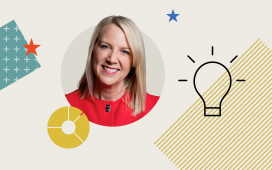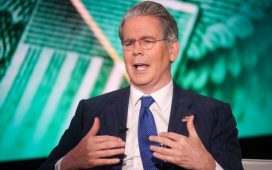The luxury goods sector has struggled in recent times amid economic uncertainty and slowing trade in China, but one well-known brand is defying the wider gloom.
Birkenstock just posted its best quarterly performance ever, with revenues soaring 19 per cent to €565million (£471million) in the three months ending June.
The historic German shoemaker enjoyed bumper demand for its ‘closed-toe silhouettes’, including its famous clunky clogs, as well as double-digit percentage growth across all key regions, especially Europe and the Americas.

Nice result: A Nottingham Forest fan wearing red Birkenstock shoes at a Carabao Cup match (pictured). The German shoemaker celebrates its 250th anniversary this year
The sandal seller’s time in the sun comes exactly 250 years since cobbler Johannes Birkenstock founded the namesake brand.
While not the world’s oldest shoe designer – Munich-based Ed Meier began in 1596 – Birkenstock’s gradual ascent to become a multi-billion dollar fashion powerhouse despite a reputation for ‘ugly’ products confirms the group’s iconic status.
But how did the group become the global fashion phenomenon it is today?
A brief history of Birkenstock
Birkenstock had to wait at least a century after its founding until its first eureka moment in 1897, when Johannes’ great-grandson, Konrad, developed a three-dimensional last – a foot-shaped mechanical device used by shoemakers to manufacture and repair.
This was followed by a contoured insole made of cardboard, leather and cork five years later.
At a time when most insoles were flat, these two features intended to replicate the human foot’s shape more closely, thereby making walking more comfortable.
About two decades afterwards, Konrad registered the ‘footbed’ trademark for his flexible insoles and opened a factory in Friedberg, Germany, from where products were exported all across mainland Europe.
The Second World War significantly boosted trade as many injured ex-servicemen sought to ease their chronic foot pain.
Konrad’s grandson, Karl, eventually broadened the firm’s reach into sandals making, releasing his first model in 1963.
Later renamed the ‘Madrid’, the first Birkenstock sandals had an insole with a heel cup and toe grip.
They did not immediately sell well, but their international popularity took off after Margot Fraser discovered them in 1966 while on a German spa holiday.
Impressed by how they relieved her foot pain, Fraser started selling Birkenstocks to American customers, gaining an audience during the 1970s with hippies and health food stores.
Birkenstocks later became sported by new subcultures, including surfers, skaters, and grunge fans, then made a foray into high fashion as supermodels like Kate Moss and Heidi Klum became associated with the brand.


Big names: Supermodel Kendall Jenner and Actress Gwyneth Paltrow sporting Birkenstocks
The Birkenstock family gave up control of the business in 2012. A year later it was restructured from 38 companies into three units to become the Birkenstock Group.
Today, the shoemaker is predominantly owned by L Catterton, a private equity firm backed by French luxury conglomerate LVMH and its market cap stands at roughly $9.1billion.
Birkenstock’s greatest strengths
With a strong heritage and a name synonymous with comfy sandals, Birkenstock is one of fashion’s most globally recognised brands.
Women comprised 72 per cent of its customer base as of last year, with major celebrities, from Gwyneth Paltrow to Kendall Jenner and Sienna Miller, helping to drive demand.
But Birkenstock is not just a sandals designer; consumers can buy ankle boots, ballet flats, trainers, and slippers from the company’s stores and website.
A broader product range shields the business from a potential slowdown in sandal sales while also secures additional shelf space with its key wholesale partners.
Young girls and women no longer see delicate stilettos and high heels as the ideal
Fiona Cincotta, City Index Group
Sam North, a market analyst at eToro, noted the brand has ‘good relationships’ with retailers like Office Holdings and Foot Locker, enabling Birkenstock to reach ‘a wide range of shopping destinations’.
Among the major British high street names that stock Birkenstock’s shoes are Next, JD Sports, and John Lewis & Partners.
North added Birkenstock has benefited from collaborations with iconic fashion houses, such as Dior, Valentino, or Manolo Blahnik, some of which have sold out.
Such designs have helped to expand the brand’s popularity among more high-end shoppers and slowly transformed its reputation from unattractive functionality to affordable luxury.
Analysts are also reassured by Birkenstock’s management team led by Oliver Reichert, a former war correspondent who took over as chief executive in 2013 as the group’s first boss from outside the founding family.
Under his leadership, the company’s revenues have grown by an average annual rate of 20 per cent, while total sales more than quintupled from €292million in 2014 to approximately €1.5billion in 2023.
Why are Birkenstock’s sales booming while so many luxury brands are struggling?
Lockdown restrictions put a rocket under the firm’s revenues as the surge in working from home encouraged consumers to value comfort and casualness over style.
Covid-related curbs now seem a distant memory, but the appetite for comfortable fashion brands has not abated.
Fiona Cincotta, senior market analyst at City Index Group, says: ‘Young girls and women no longer see delicate stilettos and high heels as the ideal, and instead, chunky and comfortable are top of the list.’
Birkenstock’s sales jumped by 30 per cent to £1.1billion in the financial year ending September 2023. In the following nine months, revenue increased by around 21 per cent year-on-year to more than £1.3billion.

Please decide: In the Barbie movie, ‘Stereotypical Barbie’ is pressured by ‘Weird Barbie’ (played by Kate McKinnon, pictured) to choose the Birkenstock over a pink high-heel so she could ‘know the truth about the universe’
Trading received an unlikely uplift from the Barbie movie, the world’s highest-grossing film of 2023.
In a scene reminiscent of The Matrix, ‘Stereotypical Barbie’ (played by Margot Robbie) is pressured by ‘Weird Barbie’ (Kate McKinnon) to choose the Birkenstock over a pink high-heel so she could ‘know the truth about the universe.’
The exposure provided by the film helped Birkenstock shrug off a broader slowdown affecting the global luxury sector caused partly by cost-of-living pressures and weaker demand in the Americas and Asia, especially China.
Burberry just fell out of the FTSE 100 after its shares more than halved since the year began amid plunging sales and profit warnings.
Hugo Boss, Burberry and Gucci owner Kering also recently declared profit warnings, while LVMH – the world’s biggest luxury goods seller – saw first-half operating profits decline by 14 per cent.
Can Birkenstock continue its impressive growth?
Birkenstock has continued to sustain healthy sales growth since going public on the New York Stock Exchange in October 2023.
Yet in its initial public offering prospectus, the company cautioned of numerous risk factors that could derail its expansion.
These included the threat of counterfeit or knock-off products, where copycats design shoes similar to those made by Birkenstock but sell them at a cheaper price.
Birkenstock has often been reluctant to sell its wares on third-party platforms like Amazon and Instagram due to counterfeiting issues, causing the firm to miss out on extra sales and hurting its brand reputation.

Huge growth: Birkenstock’s total annual sales more than quintupled from €292million in 2014 to around €1.5billion in 2023
It also expressed concern about the ‘intense competition’ it faces, particularly in the Asia-Pacific, Middle East and Africa regions, where Birkenstock is a relatively new market entrant.
eToro’s North suggests Crocs and Dr Martens could eat into the firm’s market share, given their reputation for comfortable footwear.
The two groups assemble most of their products in Asia, where cheaper labour costs give them more room to sell their goods at cheaper prices.
By contrast, Birkenstock almost exclusively makes shoes in Germany, which means higher production costs and different risks from supply chain disruption.
Birkenstock marks its 250th birthday with much to celebrate.
The group’s ability to halt a sudden reversal in the tides of fashion may be limited, but it could help maintain its momentum by blunting rivals’ competitive edge.
Natasha Nair, an analyst at Third Bridge, recommends that the business manufacture their products ‘closer to crucial end markets’ like China and the United States.
But, Nair warns: ‘The key will be maintaining product quality and their premium, handmade brand image as they scale up production’.
DIY INVESTING PLATFORMS

AJ Bell

AJ Bell
Easy investing and ready-made portfolios

Hargreaves Lansdown

Hargreaves Lansdown
Free fund dealing and investment ideas

interactive investor

interactive investor
Flat-fee investing from £4.99 per month

Saxo

Saxo
Get £200 back in trading fees

Trading 212

Trading 212
Free dealing and no account fee
Affiliate links: If you take out a product This is Money may earn a commission. These deals are chosen by our editorial team, as we think they are worth highlighting. This does not affect our editorial independence.
Some links in this article may be affiliate links. If you click on them we may earn a small commission. That helps us fund This Is Money, and keep it free to use. We do not write articles to promote products. We do not allow any commercial relationship to affect our editorial independence.











